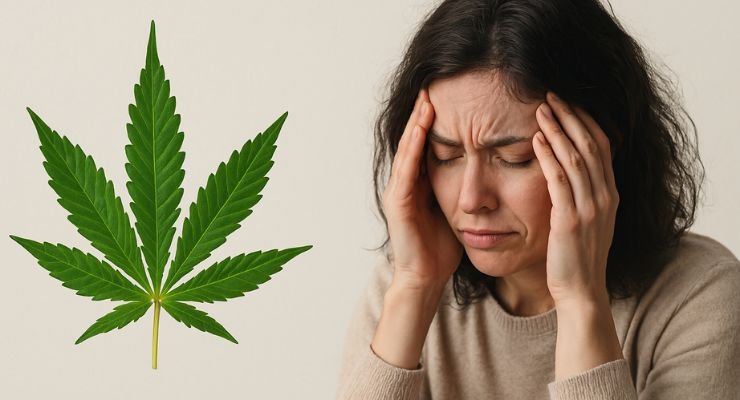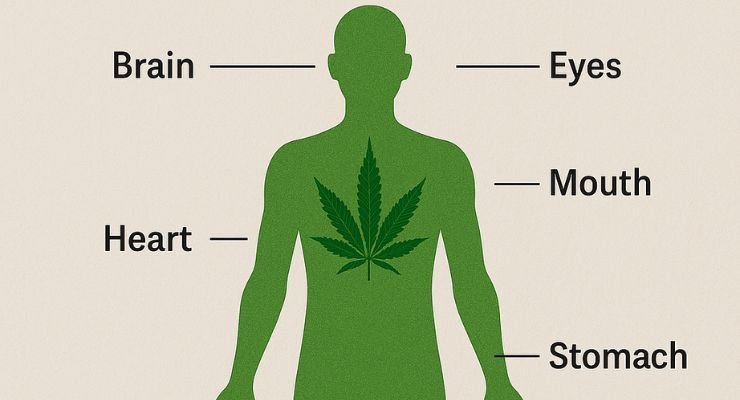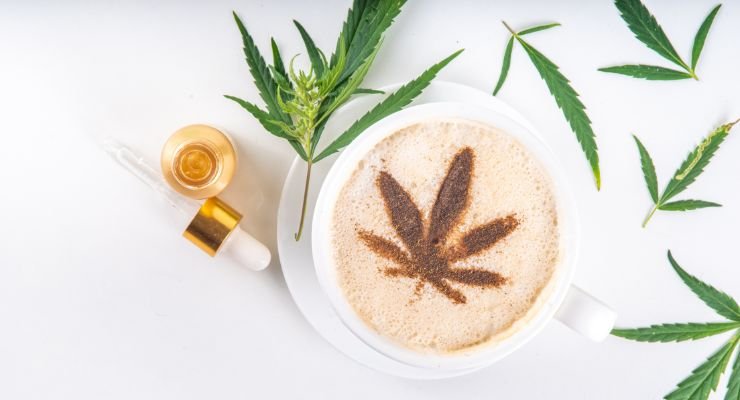
Life today has become more stressful than ever. The pressure of work, financial struggles, and personal responsibilities are pushing people to their limits. This is leading to rising cases of anxiety and stress. There are lots of individuals who depend on medications to cope; however, they do come with unwanted side effects. Because of this, people are exploring natural alternatives, with weed for anxiety becoming a popular choice. Cannabis, a plant known for its calming effects, has been used for centuries for both medicinal and recreational purposes. However, its legal status varies worldwide, with some countries allowing its use while others still ban it due to concerns over misuse and dependency.
Uruguay, Canada, and Georgia were the first three countries to legalize cannabis, with Canada making it legal in 2018. Since then, millions of Canadians have turned to marijuana for anxiety, and according to stats, it shows that over 7.3 million people in Canada consume cannabis. People have also developed many different cannabis products, such as CBD oil for anxiety, edibles like cannabis gummies, and topical creams. In today’s fast-moving world, stress and mental health challenges are becoming more common. Anxiety and depression are widespread, and many are asking, “Does weed help with anxiety?” Studies suggest that CBD for anxiety and CBD for stress may provide relief by promoting relaxation. However, when comparing CBD vs. THC for anxiety, CBD is considered the better option for those seeking relief without the psychoactive effects of THC.
In this blog, you will understand what anxiety is and its symptoms, get a simple explanation of stress, learn how cannabis affects your body, discover the amazing CBD benefits, learn some of the most effective ways of using cannabis for managing stress, learn about risks that you should know about and how to use cannabis safely, and lastly, learn about other kinds of natural alternatives that you can use for anxiety and stress. All of this information will help you to use CBD anxiety treatments safely and make informed choices about your mental well-being.
Understanding Anxiety And Its Symptoms

Anxiety is a natural response to stress, but for some people, it becomes extremely overwhelming and can affect their day-to-day lives. It causes excessive worry and fear, even when there is no real danger. People with CBD anxiety often struggle to focus, feel restless, and experience physical symptoms like muscle tension and fatigue. While treatments like CBD oil for anxiety and therapy can help, not everyone responds the same way. Some ask, “Does weed help with anxiety?” while others prefer comparing CBD vs. THC for anxiety before deciding on a treatment. CBD benefits are widely discussed, especially for managing symptoms without the high from THC.
Symptoms Of Anxiety
There are some common symptoms of anxiety:
- Feeling nervous or on edge
- Constantly overthinking or racing thoughts
- Increased heart rate or rapid breathing
- Trouble sleeping and frequent fatigue
- Difficulty concentrating due to worry
- Sweating or trembling
- Gastrointestinal (GI) discomfort
- Feeling restless or easily irritated
- Avoiding situations that trigger anxiety
Anxiety can take different forms, and each type has its own challenges. Knowing the different types of anxiety disorders can help in understanding their effects on mental health.
Types Of Anxiety Disorders:
- Generalized Anxiety Disorder (GAD): Causes constant and excessive worry about everyday things, making it hard to relax or focus.
- Social Anxiety Disorder: Triggers intense fear of social situations due to self-consciousness and fear of judgment.
- Panic Disorder: Leads to sudden panic attacks with a racing heart, shortness of breath, and a feeling of losing control.
- Separation Anxiety Disorder: Common in children but can also affect adults, causing distress when away from loved ones.
- Specific Phobias: Intense fear of specific things, like heights, small spaces, or certain animals, leading to avoidance behaviour.
- Substance-Induced Anxiety Disorder: Anxiety triggered by drug use, withdrawal, or exposure to certain medications or substances.
Anxiety can make everyday tasks feel overwhelming, but treatments like marijuana for anxiety and CBD for stress are gaining popularity. It is important to find the right approach that works best for you.
Stress Explained In Simple Terms

Stress is your body’s way of reacting to pressure or challenges. It is different from anxiety because stress is usually caused by external situations, while anxiety can happen even without a clear reason. Work deadlines, money problems, and relationship struggles are common reasons for stress. When stress is short-term, it can help you stay focused and alert. However, long-term stress can harm both your mind and body. Some people explore options like weed for anxiety or CBD for stress to manage their symptoms. Others compare CBD vs THC for anxiety to understand their effects. Studies suggest CBD benefits may include relaxation and better sleep, making products like CBD oil for anxiety a popular choice.
Types Of Stress
Stress affects people differently. Some experience it for a short time, while others deal with it for months or even years. Below you will see different types of stress:
- Short-Term Stress: This type of stress happens for a short period, like before an exam or during a busy workday. It can make you feel tense, but it usually goes away once the situation improves.
- Chronic Stress: When stress lasts for a long time, it can weaken the immune system, increase blood pressure, and even lead to anxiety or depression. Many look into CBD anxiety solutions, like CBD for anxiety, as part of their stress management plan.
- Acute Stress: This is short-term stress that happens suddenly and does not last long. It usually occurs due to specific situations like preparing for a big event, giving a speech, or dealing with an argument. This type of stress often fades once the situation is over.
- Episodic Acute Stress: This type of stress occurs when someone experiences acute stress frequently. People who always feel rushed, overwhelmed, or under pressure may suffer from episodic acute stress. With the passage of time, this can lead to serious health issues if not managed properly.
Symptoms Of Stress
Stress can affect the body, mind, and behaviour. Below is a table showing the different types of stress symptoms:
| Physical Symptoms | Psychological Symptoms | Behavioral Symptoms |
|---|---|---|
| Headaches | Anxiety or constant worry | Overeating or loss of appetite |
| Fatigue or tiredness | Depression or sadness | Smoking or drinking too much |
| High blood pressure | Feeling irritated or angry | Avoiding responsibilities |
| Muscle tension | Trouble concentrating | Gambling or excessive shopping |
| Trouble sleeping | Feeling overwhelmed | Using drugs to cope |
The Effects Of Cannabis On The Body

The human body is made up of different systems, each with a unique function. Cannabis affects multiple systems in different ways, from short-term changes to long-term effects. By reading below, you will learn how weed for anxiety, CBD for stress, and other cannabis compounds impact these systems.
Endocannabinoid System (ECS)
The Endocannabinoid System (ECS) plays a key role in regulating mood, memory, pain, and immune response. The body naturally produces endocannabinoids, which interact with receptors in the brain and body. CBD benefits include supporting ECS function, while THC binds to receptors, causing psychoactive effects. Research on CBD vs THC for anxiety shows that CBD may promote relaxation without the high.
Respiratory System
The respiratory system helps in breathing by delivering oxygen and removing carbon dioxide. Smoking or vaping marijuana for anxiety introduces harmful chemicals that can irritate the lungs, leading to coughing, mucus buildup, and long-term lung problems. However, CBD oil for anxiety and edibles avoid lung exposure.
Circulatory System
The circulatory system pumps blood through the body. THC can cause a temporary increase in heart rate, making the heart work harder. Some studies suggest that cannabinoids may lower blood pressure over time, but people with heart conditions should be cautious when using cannabis.
Central Nervous System (CNS)
The CNS controls movement, thoughts, and emotions. CBD for anxiety is believed to interact with receptors in the brain to promote calmness, while THC releases dopamine, causing a euphoric high. Long-term use may affect memory, concentration, and coordination.
Digestive System
The digestive system processes food and absorbs nutrients. CBD oil for anxiety may help with nausea and improve digestion. On the other hand, THC can increase appetite, often referred to as “the munchies.” Some users may experience stomach discomfort if they consume too much.
Immune System
The immune system defends the body from illness. Some research suggests cannabis may weaken the immune response, making the body more vulnerable to infections. However, for people with autoimmune conditions, cannabis may help by reducing inflammation and regulating immune activity.
Understanding how CBD anxiety products and CBD benefits interact with the body can help users make informed decisions. Whether using CBD for stress or managing health conditions, knowing these effects is important for safe and effective cannabis use.
Top Benefits Of Using Cannabis For Anxiety And Stress

There are many people who turn to weed for anxiety and stress relief. The natural compounds in cannabis, including CBD for anxiety and CBD for stress, interact with the body’s system to promote calmness. Below, you will find the key benefits of using cannabis for managing anxiety and stress.
- Helps Lower Cortisol Levels: Cortisol is the hormone responsible for stress. Cannabis, especially CBD oil for anxiety, may help reduce its levels, promoting a more relaxed state and lowering feelings of nervousness.
- Encourages Relaxation And Better Sleep: Many people struggle with stress-related insomnia. CBD for stress may help calm the mind and body, making it easier to fall asleep and stay asleep throughout the night.
- May Improve Mood And Emotional Balance: CBD benefits include its potential to regulate mood by interacting with the brain’s serotonin receptors, which can help ease anxious thoughts and emotional instability.
- Supports Those Struggling With Anxiety-Related Conditions: Cannabis may be beneficial for those dealing with social anxiety and PTSD. CBD vs. THC for anxiety suggests that while THC may provide immediate relief, CBD offers calming effects without intoxication.
- May Provide Relief Without Impairing Mental Clarity: Unlike THC, CBD for anxiety does not cause a “high,” allowing users to experience relaxation and stress relief while staying focused and clear-headed.
- Reduces Nervousness In Social Situations: Many people with CBD anxiety report that it helps them feel more at ease in social settings, making it easier to engage in conversations and feel comfortable in crowds.
Best Cannabis Options For Anxiety And Stress
There are many great choices of weed for anxiety and stress relief. Some are rich in CBD for anxiety, while others have a balance or more THC. Keep reading to learn about the top options and how each one can help with anxiety and stress.
CBD-Dominant Strains
Strains with high CBD for stress and low THC are often preferred for their calming effects without feeling high.
Alternative Cannabinoid Dietary Cannabis (ACDC): This strain is well-known for its high CBD benefits and very low THC, making it great for staying relaxed and clear-headed.
Charlotte’s Web: Popular for CBD oil for anxiety, this strain is gentle and has helped many people feel more balanced and less overwhelmed.
Low Risk Of Feeling High: Because of the low THC levels, these strains do not usually cause mental fog or strong effects.
Great For Daytime Use: You can stay focused while easing anxiety and tension throughout the day.
Balanced Strains (CBD and THC)
Balanced strains contain a mix of CBD and THC, offering gentle calmness with mild uplifting effects.
Harlequin: This option provides a nice mix of CBD vs. THC for anxiety, giving both peace and a small boost in mood.
Cannatonic: Known for fast-acting relief, this strain helps calm the mind without being too strong or sleepy.
Less Chance Of Anxiety From THC: The balanced ratio helps reduce the risk of feeling overwhelmed from too much THC.
Helpful For Stress And Mild Discomfort: May also ease tension in the body while helping with CBD anxiety.
THC-Dominant Strains
Strains with more THC can offer deep relaxation, especially in the evening or before sleep.
Granddaddy Purple: Often used to wind down after a long day, this one brings calm and peace to the mind and body.
Northern Lights: A classic marijuana for anxiety, this strain helps quiet racing thoughts and supports a full night of rest.
Best For Night-Time Use: Strong THC effects can be more intense, so they are better before sleep or when you have no tasks ahead.
Can Help With Deep Stress: Some people prefer THC-heavy strains when anxiety is high or after emotional days.
Risks To Consider And How To Use Safely
While many people turn to weed for anxiety or CBD for stress, it is important to know that cannabis use does come with certain risks. Understanding how to use it safely can help you get the benefits without unwanted side effects.
Risks Of Consuming Cannabis
Using marijuana for anxiety may not be safe for everyone. It can lead to side effects like drowsiness, memory problems, or a fast heartbeat. Some people may develop a dependency or feel worse mentally, especially if they already deal with mood issues. Smoking cannabis can also affect your lungs over time. Laws about cannabis are different in every state, so always check what is legal in your area before using it.
How To Use It Safely
If you want to try CBD for anxiety or stress, start with small amounts of CBD oil for anxiety and increase slowly. Choose trusted brands and avoid mixing cannabis with alcohol or other drugs. It is best to talk to a doctor first, especially if you take any medication or have health problems. Products with more CBD and less THC can offer CBD benefits without strong highs. Always follow safe amounts and avoid driving while using it. Learning the difference between CBD vs THC for anxiety can also help you make better choices for your health and well-being.
Natural Alternatives For Anxiety And Stress
While weed for anxiety or CBD for anxiety can be helpful for some people, they are not the right choice for everyone. That is why it is a good idea to explore other natural ways to manage stress and anxiety without using marijuana for anxiety or CBD oil for anxiety.
Mindfulness And Meditation
Mindfulness: Mindfulness means paying attention to what is happening right now without judging it. This practice helps calm the mind and reduce stress by slowing down racing thoughts. It can also improve focus and emotional balance.
Meditation: Meditation is a quiet time where you focus on your breath or a calming thought. Just a few minutes each day can help lower anxiety and help you feel more relaxed. It is a simple habit with no side effects, unlike CBD vs. THC for anxiety.
Exercise And Yoga
Exercise: Exercise, like walking, biking, or dancing, can help your body release chemicals that make you feel happy. It also helps you use up nervous energy, improves your mood, and boosts your sleep quality.
Yoga: Yoga combines slow body movements, breathing, and relaxation. It is gentle but powerful, helping both your mind and body feel better. It is a great choice if you want relief without turning to CBD anxiety or other products.
Herbal Supplements (Ashwagandha And Chamomile)
Ashwagandha: Ashwagandha is also known as “Indian ginseng or winter cherry.” It is a natural herb used for many years to help the body handle stress. It may help reduce anxiety and balance your mood. It is often found in capsules, powders, or teas.
Chamomile: Chamomile is another calming herb, often used as tea. It can help you feel more relaxed and may also improve sleep. If you are unsure about using CBD for stress or CBD benefits, herbal teas like chamomile are a gentle place to start.
Conclusion
Cannabis is becoming a popular natural option for managing anxiety, stress, and sleep issues. Here, you learned about how cannabis may help reduce anxiety, improve sleep quality, and support relaxation, especially through options like CBD for stress and weed for anxiety. You also discovered the science behind how it works, potential benefits, risks like dependency or side effects, and the importance of choosing the right strain and dosage. While cannabis may provide relief for some, it’s not a one-size-fits-all solution. Responsible use is essential. Make sure to start with a low dose and go slow. Most importantly, speak with a healthcare professional before using cannabis to ensure it’s safe and suitable for your personal needs.

